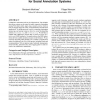118
click to vote
WISE
2009
Springer
15 years 11 months ago
2009
Springer
In this paper, we present a Web recommender system for recommending, predicting and personalizing music playlists based on a user model. We have developed a hybrid similarity match...
115
click to vote
WISE
2009
Springer
15 years 11 months ago
2009
Springer
Web-based environments typically span interactions between humans and software services. The management and automatic calculation of trust are among the key challenges of the futur...
WISE
2009
Springer
15 years 11 months ago
2009
Springer
Abstract. Under Social Tagging Systems, a typical Web 2.0 application, users label digital data sources by using freely chosen textual descriptions (tags). Mining tag information r...
100
click to vote
WISE
2009
Springer
15 years 11 months ago
2009
Springer
Recently, existing design methodologies targeting traditional Web applications have been extended for Rich Internet Application modeling support. These extended methodologies curre...
117
Voted
WISE
2009
Springer
15 years 11 months ago
2009
Springer
This paper presents an extended architecture of a policy definition framework fine-tuned for service-oriented environments conforming to the SOA distributed processing paradigm. We...
83
Voted
WISE
2009
Springer
15 years 11 months ago
2009
Springer
We present work in the spatio-temporal-thematic analysis of citizen-sensor observations pertaining to real-world events. Using Twitter as a platform for obtaining crowd-sourced obs...
WISE
2009
Springer
15 years 11 months ago
2009
Springer
-5
111
click to vote
Publication
Finding My Needle in the Haystack: Effective Personalized Re-ranking of Search Results in Prospector
15 years 11 months ago
Abstract. This paper provides an overview of Prospector, a personalized Internet meta-search engine, which utilizes a combination of ontological information, ratings-based models o...
118
click to vote
Publication
Abstract. Nowadays, the most dominant and noteworthy web information sources are developed according to the collaborative-web paradigm, also known as Web 2.0. In particular, it rep...
177
Voted
HYPERTEXT
2009
ACM
15 years 11 months ago
2009
ACM
Collaborative annotation tools are in widespread use. The metadata from these systems can be mined to induce semantic relationships among Web objects (sites, pages, tags, concepts...


